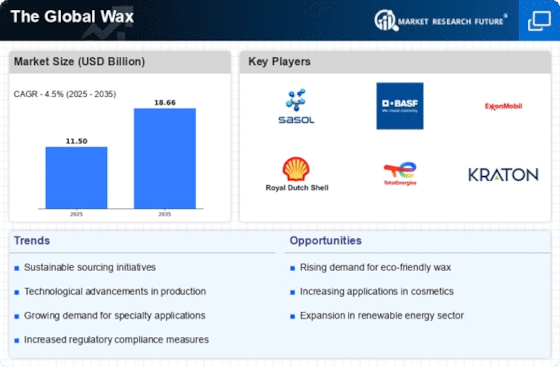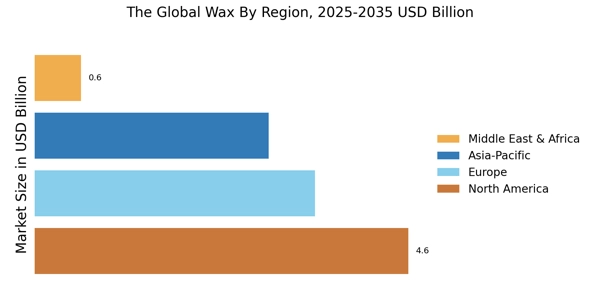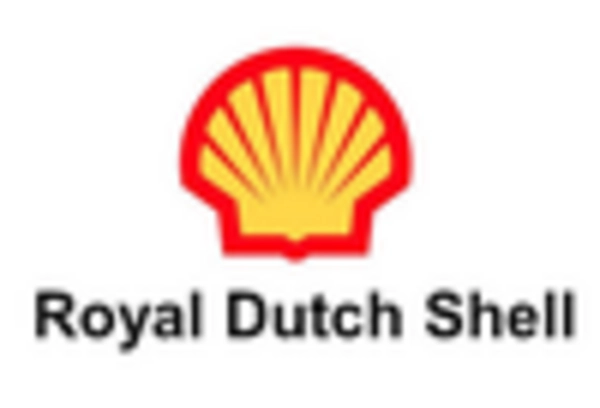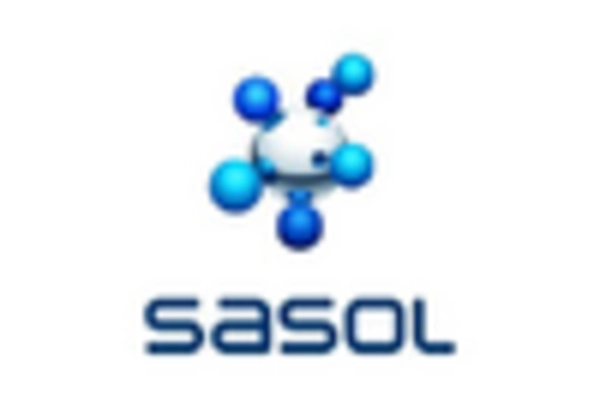Expansion of the Food Industry
The food industry plays a pivotal role in driving The Global Wax Industry, particularly through the use of waxes in food packaging and preservation. Natural waxes, such as paraffin and beeswax, are increasingly employed to enhance the shelf life of food products and maintain their quality. The market for food-grade waxes is expected to witness a growth rate of around 5% over the next few years, as manufacturers seek sustainable and safe packaging solutions. Additionally, the rise in organic and health-conscious consumer trends is likely to propel the demand for natural waxes in food applications. This shift towards eco-friendly packaging options may lead to innovations in wax formulations, further stimulating market growth.
Growth in Candle Manufacturing
The candle manufacturing sector is a significant contributor to The Global Wax Industry, with a consistent demand for various types of waxes, including paraffin, soy, and palm wax. The market for candles is projected to grow at a rate of approximately 6% annually, driven by the increasing popularity of scented and decorative candles among consumers. This trend is particularly pronounced in regions where candles are used for both functional and aesthetic purposes. As consumers seek unique and personalized experiences, manufacturers are likely to explore diverse wax blends and innovative designs, thereby enhancing the overall market landscape. The rise of home decor trends and the growing emphasis on ambiance in living spaces further bolster the demand for candles.
Rising Demand in Personal Care Products
The increasing consumer inclination towards personal care products is a notable driver for The Global Wax Industry. Waxes are extensively utilized in cosmetics, skincare, and hair care formulations due to their emollient properties and ability to enhance product texture. The personal care segment is projected to account for a substantial share of the market, with a growth rate of approximately 4.5% annually. This trend is fueled by a growing awareness of personal grooming and the desire for high-quality, natural ingredients in beauty products. As consumers become more discerning, manufacturers are likely to innovate and incorporate various waxes, such as beeswax and carnauba wax, into their formulations, thereby expanding the market further.
Technological Innovations in Wax Production
Technological advancements in wax production processes are emerging as a crucial driver for The Global Wax Industry. Innovations such as the development of bio-based waxes and improved refining techniques are likely to enhance product quality and sustainability. The introduction of advanced extraction methods, such as supercritical fluid extraction, may lead to higher yields and purer waxes, catering to the evolving demands of various industries. Furthermore, the integration of automation and smart technologies in manufacturing processes could streamline production and reduce costs. As companies strive to meet regulatory standards and consumer expectations for eco-friendly products, these technological innovations may play a vital role in shaping the future of the wax market.
Increasing Applications in Industrial Sectors
The diverse applications of waxes across various industrial sectors are significantly influencing The Global Wax Industry. Waxes are utilized in coatings, adhesives, and sealants, providing essential properties such as water resistance and durability. The industrial segment is anticipated to grow at a rate of approximately 4% annually, driven by the rising demand for high-performance materials in construction and automotive applications. As industries increasingly focus on enhancing product performance and sustainability, the demand for specialized wax formulations is likely to rise. This trend may lead to collaborations between wax manufacturers and industrial companies, fostering innovation and expanding the market reach.

















